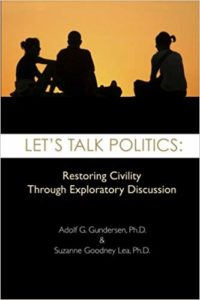 Continued progress towards full political equality is not likely to occur without real effort. Consequently, those of us who suspect that American politics isn’t as fair as it should be are faced with a real dilemma. The situation makes us want to sit on the sidelines, but it won’t improve if we do. One of the key contributions civil discussion can make to public life is to break through this hopelessness and passivity, not by riling people up, but rather by getting them involved in an environment that builds trust.
Continued progress towards full political equality is not likely to occur without real effort. Consequently, those of us who suspect that American politics isn’t as fair as it should be are faced with a real dilemma. The situation makes us want to sit on the sidelines, but it won’t improve if we do. One of the key contributions civil discussion can make to public life is to break through this hopelessness and passivity, not by riling people up, but rather by getting them involved in an environment that builds trust.
–From Chapter 3 of Let’s Talk Politics: Restoring Civility Through Exploratory Discussion (Gundersen and Lea, 2013)
If you’ve been following the news these last few months, you’ve undoubtedly run across many depressing stories. The news tends to focus on negative events, problems, and other information that can steal your joy and rob you of hope. Indeed, more and more of the people I encounter note that they largely try to avoid the latest news stories as they find that hearing what’s happening in our world tends to leave them feeling depressed, frustrated, and powerless. Undoubtedly, you’ve felt the same at times—and yet most of us remain plugged-in as we have a core belief in the capacity for our world to change and to become more in line with the ideals with which we started life.
Spend some time with any small child, and you will notice that all of them seem to have a sense of fairness and equity, optimism, and curiosity. Your sense of justice, which was undoubtedly cultivated early in your life, might have been tested by news that broke this month regarding the extent of graft and fraud enacted by some to get their children into top colleges. Many of these efforts were illegal, but immoral efforts continue largely unabated. This might cause you to want to throw in the towel, but we’d encourage you to instead put on your facilitator’s cap and try out the new IF discussion guide with a group of working-class high school students in your community. We’ve been doing just that in Warren, Michigan, thanks to the efforts of Elaine Bassett, aka “Mama Bassett.” The discussions she’s done with young people, their parents, and high school and community college advisors in that working-class suburb of Detroit has been profound.
Elementary school initiates our formal schooling and tracks us—even from our youngest years—towards a future that ideally includes college. In fact, though, only one-third of Americans have a four-year degree (though this is the largest percentage ever recorded in the U.S.). That number is much lower in places like Warren, Michigan (part of Macomb County, home to GM World Headquarters, where just under 25% of residents have a college degree) or throughout the state of West Virginia where the Interactivity Foundation is based (about 12% of residents there have a 4-year degree).
Throughout the “Rustbelt” and in many rural areas of this country, there is little effort to internalize a sense in kids that “I am college material.” Indeed, most public schools do little to build this identity in their students, even over thirteen years of study. Too many students in places like Warren, Michigan, or Parkersburg, West Virginia, develop the sense that, while college seems like a route to a more stable economic future, they’re just “not college material.” Despite having SAT scores in the 1200 – 1350 range, which is certainly sufficient for most colleges, many of the students Elaine has engaged noted that they had no idea how to apply to college, didn’t think they qualified, or just didn’t want to do more school after feeling marginalized and bored throughout their K-12 years. One young woman had applied to the local community college, awaited a reply, but never heard back and thus figured she had been rejected. She later discovered that there is an “open admissions” policy and so no one has to really wait to be admitted. Well, then, why have an application?
What was so remarkable about the discussions Elain has organized, however, is the impact that they have had. Simply having an initial discussion about college access inspired one group of seven kids to work together to apply what they talked about in the discussion. ALL of the kids in that initial group have either applied to a four-year program, finally started at the community college, or otherwise advanced their academic interests by attending a college fair or tour or sending off for information about a couple of local area colleges. All of them knew that college seemed a pathway to greater success and financial stability, but none had any idea how to get on that track. One big worry was the cost of higher education. Even community college costs were prohibitive to several students. They were not aware of how grants worked and very reticent about loans. Indeed, one of the most fascinating things we learned is that young people often avoid even starting a program and taking just one class because they worried about “messing up” and wasting that money. There feels, to them, like there is no room for any risk at all. However, simply making school “free” was not an evident solution: most of the working-class folks we engaged were very skeptical of anything that was “free,” something that colleges in the area are increasingly offering as an option—motivated by a genuine ambition to educate more working-class, first-generation students. Still, their approach may backfire because they are developing policies without talking with the people the policy will most direclty impact.
What seems especially critical is to engage the people you’re aiming to “help.” The white working class is currently a pariah in our nation. Their more affluent counterparts—at least the more liberal ones—tend to blame this group for bringing us Trump, characterizing the whole lot as racist dupes. But an HBO documentary that aired on March 25, 2019, paints a very different picture. The white working-class in this country is so miserable and hopeless that, for the last three years running, they are dragging down the entire national life-expectancy average. That average hasn’t declined like that in a century. Sanjay Gupta of CNN directed the documentary, One Nation Under Stress, and draws out the fact that skyrocketing deaths due to opioid overdoses, suicide, and liver failure are massively affecting white, working-class people in the 35-55 year age range. In just the last week, one of the people with whom I graduated high school, who still lived in Warren, Michigan, killed himself, and one of my cousins overdosed. In places like Warren, this sort of thing happens every week. Job losses among this population have continued unabated since the mid-1980s. Many people essentially retire in mid-life (often their mid-40’s) and try to cobble together piece work so as to get by, but, increasingly, many are simply giving up. Suicide rates are up 40% in such regions over the last fifteen years. These deaths are so common that they now have a name: “death by despair.”
Young working-class whites, however, are not yet so hopeless. One of the researchers interviewed for Gupta’s film noted that a bachelor’s degree can literally be the demarcation line between a sustainable life and a life of despair. Now, there are some good arguments for why it may not be a great idea for everyone to get a college degree. We do need trades people! But that is all part of the conversation to be had. Please contact me, Suzanne Lea, IF Fellow, at [email protected] and help us to engage more young people in these conversations. If you or someone you know is like “Mama Bassett” (Elaine) and find that all the kids in your neighborhood tend to end up at your house, hanging out, let us spring for some pizza so that they can really begin to think about what college is, how it works, and why they very well may be college material (their sense of discovery, ambition, and enthusiasm is immensely infectious—we promise!). We especially want to see lots more of these conversations in rural and working-class areas where many kids often do not go to college or, these days, even trade programs (which are often housed at community colleges). YOU can make a huge difference in a young person’s life! We need an army of Mamas!!


